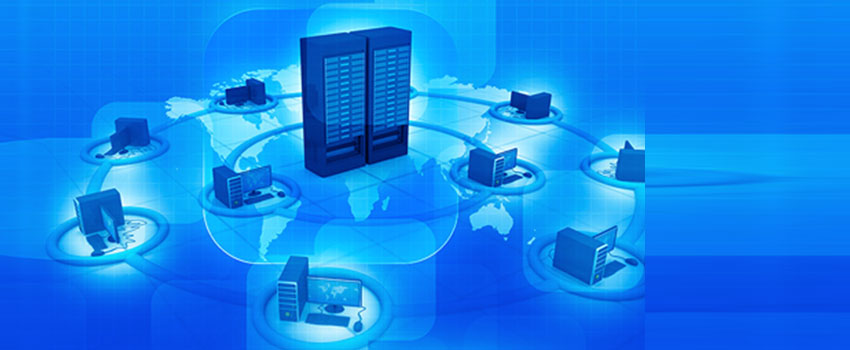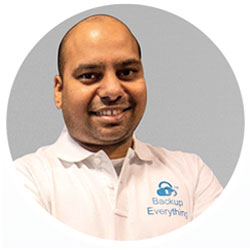Different Routes for Data Backup
There are two main ways to backup data. One is done by making copies of the vulnerable data on the local storage devices such as external hard drives. The other method implies parking of important data over remote servers using cloud technology. Both cloud and external storage proves to be one of the most effective ways to prepare data backups.
However, both of these methods have a very common shortcoming. While external storage requires extra physical space, cloud backup requires data parking on the third party’s virtual storage location.
FREE TRIAL FOR 30 DAYS – TRY IT NOW
TNetwork Attached Storage (NAS) considers the shortcomings of both the cloud and the external hard drive storage. It is basically a mix of both of them. NAS drives relieve the users from the hassle of arranging extra space by providing in-built space. Furthermore, NAS provides network connectivity to let user access networks the same as the cloud provides.This allows data to be shared and accessed amongst all the PCs connected to the network, to which NAS is connected. Apart from having an in-built storage medium and network, NAS has a built-in operating system. This personalized operating system aids certain operations like printer, media streaming and remote access.
Advantages of Network Attached Storage (NAS)
There are many advantages of using NAS devices as a backup contingency plan. Out of those, the following are some of the key advantages of using Network Attached Storage (NAS):
Additional Storage
Additional storage is the main advantage of using NAS. With the growing commercial and personal data, prevalent storage mediums are neither feasible nor sustainable. With the widespread of cloud technology, people prefer to park their data on off-site locations. But, security is the main concern over there.
Currently, storage needs are constantly being updated. In this situation, Network Attached Storage (NAS) is the most cost-effective way to enjoy additional storage. By using NAS, instead of allocating certain storage space to every connected computer, storage capabilities of the network can be shared amongst all users. In this way, people use what they need and the rest of the storage is left for those who have more storage needs.
Conventional hard drives can usually store data maximum up to 8 TB. But the way business data is growing these days, such storage options may sound feasible for some years but what about after it? In such scenarios, NAS has the potential to rescue business stakes. Instead of upgrading the whole system, in case of more storage needs, the user can simply plug additional hard drives in the NAS boxes.
Much Easier Collaboration
In day to day business, there are many occasions where businesses need the collaboration of different team members. For instance, there is a product document which needs to have an input of all team members. In normal business operations, such collaborations are done over emails to each member for their respective inputs. In this way, there exist several clone copies of a single document.
This hassle can be overcome by using NAS devices. All users can access the subjected document in central locations. In the case of teamwork, group edit option can be enabled. This allows document editing in the same way as it is done on the Google Docs or Office 365.
This feature will not only cut down the unnecessary mess, but it will also cut down the storage usage, which otherwise would have been consumed by the clone copies.
Private Cloud
Cloud storage is the most convenient way to prepare data backups. But this convenience comes at the cost. No one can escape the worry pertaining to data access protocols. Those who have stored their sensitive information like bank accounts and ID certificates are not sure that who can truly access their data and who cannot.
Most of the NAS devices have the option of configuring remote access. This allows the user to access data, irrespective of his/her geographical location. It basically allows users to have their private, yet personal cloud. To give full cloud storage experience, some of the NAS devices offer complementary mobile apps.
Automatic Data Backups
Managing data backups on the regular intervals is quite a difficult task. In case backup schedule is missed and on that very day if any calamity happens, then all of the recent data will be lost.
To turn off this shortcoming, NAS devices offer automatic backups service. They can even capture minor changes in the data. As soon as any modification is made into the data, this modification will immediately be reflected in the network-attached storage.
To even reassure the reliability of the data backups, one can employ the NAIS RAID setup. In this system, if any change is made to the system, then it will immediately be captured and copied to the multiple hard drives. In this way, the user will have multiple backups and can still access data even if the NAS device has malfunctioned hard drive.
Enhanced Data Protection
In modern coffee-oriented office culture, a drink spilling can ruin everything. If the probability of such events is negligible even then no one can predict expectancy of a hard drive failure.
Such probabilities can be made negligible by using NAS. With NAS, all of the data will be on a secure network-attached drive. Moreover, NAS devices usually have their own operating system. This means that the user can protect its data by protecting it with built-in data encryption feature. This ensures data protection against outside-network access as well as attempts of unauthorized access.
Simple Server Setup
The backup server is usually very complicated to setup. But when it comes to NAS devices, server setup is quite an easy task to do. This is why the simple configuration of NAS devices is one of the key advantages of using network-attached storage.
NAS devices come up with the easy web-based interface which makes it quite easy for the user to configure their device and access settings. It is even easier than setting up a wireless router.
Many NAS manufacturers have their mobile apps to compensate user’s difficulty in navigating through the web-interface. Thus, making it easier for the users to configure their NAS backup.
Choosing NAS for Small Businesses
There is no doubt in accepting the exceptional benefits of Network Attached Storage (NAS) as a contiguous backup strategy. But it is important to understand the relevance of NAS to the business operations. Bigger the organizational size, more funds will it have to invest in its IT infrastructure and so does data backups.
But as small businesses are already in the expansion phase, business growth is far more important to them rather than investing in rich disaster recovery or data backups plans. In this situation, NAS is not only a cheap way to backup lost data but effective too. Following are some of the factors which are important from the perspective of small businesses:
NAS Bays
The number of bays plays an important role in determining the right NAS device for the small business. The more bays one will have, the more drives it can add to its NAS device. In this way, not only storage capacity can be scaled up, but the system’s flexibility can also be enhanced.
However, if one could not determine the right number of bays, then many NAS devices have the option to add additional bays. In this way, if the storage falls short, then instead of buying the new NAS device, the user can scale up its storage space by just adding additional NAS bays.
RAID
RAID array is basically a collection of disks which are organized in a way that data is replicated amongst them. Their prime purpose is to ensure data redundancy. For instance, if one disk fails, then data will remain intact on the rest of the disks. Most of the NAS devices are configured as the RAID arrays.
There are multiple ways to configure the RAID. For limited data redundancy RAID – 1 is recommended. However, for more advanced data redundancy, RAID 5, 6 or 10 configurations can be used. These configurations will distribute data across multiple disks and will ensure that data should remain intact, even if more than one disks fail.
RAID can either be built into the hardware devices or can be configured with the help of a software. But it has been noticed that modern NAS devices come up with the preinstalled RAID System’s software.
Hard Drives
Generally, NAS devices are not equipped with pre-installed hard drives. Thus, the user has to install hard drives by themselves. There are mainly two categories of hard drives, namely consumer-grade drives and enterprise-grade drives.
Consumer-grade drives are not recommended as they do not have good support and there are high chances of them to get failed. On the other hand, enterprise-grade hard drives are more durable.
Apart from this, it is important to check which type of hard drive does NAS supports.
Checklist for the Effective NAS Backup
Following are some the key questions, which one must answer while picking up an appropriate NAS device:
The Choice between Synology and QNAP
Although there are plenty of vendors offering various NAS devices for small and medium businesses, QNAP and Synology are the most popular NAS vendors. As per the customer reviews, out of these two vendors, Synology is more popular and feasible.
Storage Definition
It is important to define how much storage does one needs. This number should not just reflect the storage needs, instead, it should accommodate RPOs and RTOs. More are the RPOs and RTOs, more will there be drive requirements. These two determinants play an important role in the fast and point-in-time restoration process.
Definition of RAID Type
There are several RAID types to configure with NAS devices. Generally, higher the RAID number, more protected will be the data and so does the performance. However, this will employ more numbers of hard drives. Usually, moderate practice will be to configure NAS with either RAID 5 or RAID 6 type.
Appropriate NAS Model
Once done with the determination of storage and RAID type requirement, prospective NAS user must choose an appropriate NAS model. The choice must accommodate the required number of expansion units, processor type and the RAM size, as per the subjected environment.
Hard Drive Choice
The hard drive is the prime component of any NAS device as it is where data will reside and be backed up. After choosing an appropriate NAS model it is important to look for compatible hard drives.
It is strongly recommended to use enterprise-grade drives. However, this does not mean that selection to be overdone by selecting the most expensive hard drives. As per customer reviews, Seagate Ironwolf and Western Digital Red or Red Pro, are not only reasonable ones but reliable too.
Final Note
There is no doubt in calling NAS to be an exceptional backup solution. From the cost perspective to the performance evaluation, NAS has everything that typically does an ideal backup service must have. However, this is rather a relative approach and there are number of factors which plays an integral role in the effective NAS backup.
Critics consider NAS to be an ideal data backup solution for home and small businesses. It is maybe due to the fact that resources as well as financial constraints are very much prevalent in these sectors.
While it encompasses the shortcomings of cloud storage and local storage, it offers great security with excellent performance trade-off. Apart from being cost-effective, NAS backup really lets the user exploit their physical spaces for more beneficial ventures.



